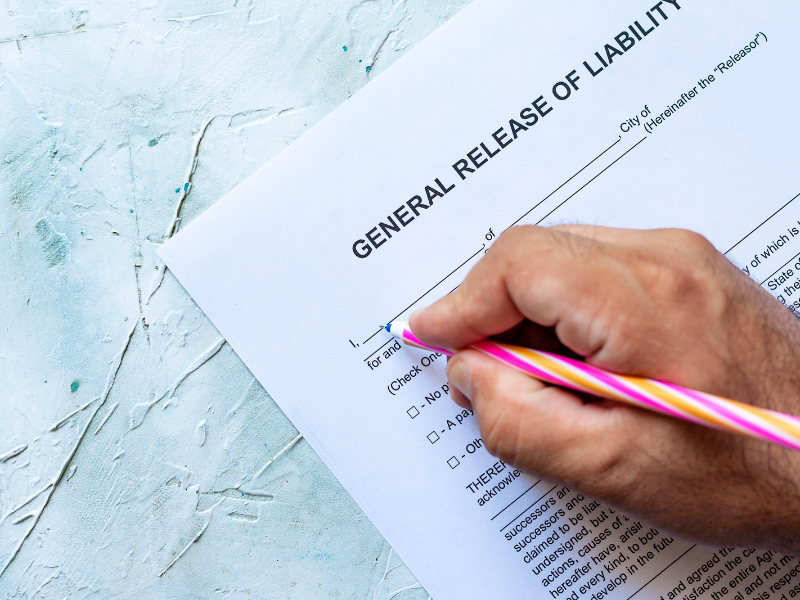Building or buying a new home can (typically) be a joyous experience. But when a new home builder doesn’t keep their promises, it can instead become a headache. Knowing what to do in that situation is crucial. It gets even trickier when you consider the rules differ depending on state and local area laws.
You may be wondering, “what recourse do I have against a home builder?”. What do you, as the homeowner or CRE owner, do when there’s a new builder breach of contract?
In this guide, we’ll walk through steps to take and illustrate the signs that a builder is breaking a contract. Before we get started, it’s important to note the laws for this topic aren’t the same everywhere. Each state has it’s own way of handling these situations.
Before We Start
Before we get on with this guide, it’s important to remember: this is not legal advice. This contents of this blog post are intended to provide general information. For legal advice, please contact us for a free consultation.
Step One: Review the Contract
The first step is to understand the contract you signed with your new home builder.
Understand the Basics
First, take some time to go through your contract and grasp the basics. What are the agreed-upon terms, timelines, and responsibilities? Look out for any disclaimers or clauses related to delays.
Likewise, what’s the statute of limitations for a breach of contract in your state? For example, California’s statute of limitations is two years for an oral contract and four years for a written one. Meanwhile, it’s no more than ten years in Florida. South Carolina is in the middle with a statute of limitations within six years of the breach.
Clarify Everything
Contracts can be tricky, but clarity is your friend.
If there’s anything you find confusing or unclear, make a note of it. The clearer the language, the better protected you are. Ensure you clarify anything you may not be fully informed about.
That goes for any legal jargon you’re unsure of. Likewise, if there are vague terms in the contract, it’s essential to address them.

Material Breaches Matter
Not every misstep by the builder is a breach of contract.
Focus on what matters – material breaches. These are significant violations that go to the heart of the agreement. They can also potentially entitle you to legal relief.
It also depends on what state you live in, though. Nevada has dispute resolutions for situations like this.
Consult with a Professional
If the language or terms seem complex, consult with real estate attorney like Pursiano Law. An expert legal team can interpret the contract and determine if there’s a case.
Step Two: Seek Legal Guidance
If you suspect you home builder is breaking a contract, legal advice is a crucial next step.
A real estate attorney can be your ally in navigating this complex situation. They will:
- Assess the details of your case and the terms of the contract to determine if there is a legitimate breach.
- Engage with the builder to try and resolve the issue. That communication is often the first step in finding a solution without going to court.
- Provide insights into the most effective solutions available under your state laws.
- If resolution talk fail, your attorney ca file a lawsuit on your behalf. Then, they’ll represent your interests in court.
When Do You Bring in Legal Help?

Consider involving an attorney early in the process. Ideally, it’s before you have to wonder, “What recourse do I have against a home builder?”
Even if you want to resolve the matter outside of court, legal guidance ensures you know your rights. A legal team can help you find potential courses of action.
Your attorney will guide you on what evidence is necessary. Documentation is essential if the matter ends up in court.
Save emails, contracts, and any other relevant materials.
Seeking legal guidance early can be a proactive step toward a resolution that protects your interests and rights.
Step Three: Document Your Case
Thorough documentation is your ally. Here’s how to effectively document your ccase.
Start Early
As soon as you suspect a breach, begin collecting evidence. The earlier you start, the more comprehensive your documentation can be.
Save ALL Communications
Keep a record of all communications with the builder. Save emails, text messages, and any written correspondence. That evidence may demonstrate the builder’s actions or lack thereof.
Take Photos
Capture photos of any defects, substandard work, or deviations from the agreed-upon specifications. Photos can be powerful tools in illustrating the issues you’re facing.
Maintain a Timeline
Create a timeline outlining key milestones, project deadlines, and any delays. Chronological records can be invaluable to prove the builder breaches a contract.
Preserve Documents
You know you’ve been gathering evidence, but where do you store it all? Ensure all relevant documents are safely stored away. These are the factors that may provide a foundation for your case!
Financial Documentation
Keep records of all financial transactions related to the project. This includes payments made to the builder, invoices, and any other costs incurred.
Professional Assessments
Obtain professional assessments regarding the issues you identify. Home inspectors, engineers, and other experts can objectively evaluate to strengthen your case.
Written Complaints
Document any and all concerns to the builder in writing. Written complaints create a paper trail that may be crucial in legal proceedings. Likewise, it falls in line with our advice earlier to save all communications.
Consult with Legal Professionals
Consult with a construction law attorney or other relevant legal team. Legal professionals can guide on you on specific evidence you’ll need for your case. They can also ensure all documentation aligns with legal standards.
Organize Your Records
Lastly, keep your documents organized. A well-organized set of records will make it easier for your attorney to understand your case. It may also strengthen your position if matters go to court.
Step Four: Consider Your Actions


So, you think a builder is breaking contract for you new home. Now, it’s time to carefully consider your next actions.
Do note that you should have your legal team help with the next two steps.
- Evaluate the Severity. First, assess the severity of the breach. Did the builder’s actions strike at the core of the contract? Or did something get lost in the smaller details?
- Waiving Contract Rights. Be cautious about actions that might be interpreted as waiving your contractual rights. If you continue with the project or make payments without addressing the breach, it could impact your legal standing.
- Repudiation – with Caution. Consider the option of repudiation with caution. Repudiation is the rejection of a duty under a contract. However, be sure you only do this under legal guidance to avoid counterclaims! In some states, like Florida, it may be considered anticipatory repudiation.
- Negotiation Strategies. If negotiations stall, explore other negotiation strategies that could lead to a resolution. Mediation or alternative dispute resolution might be effective in finding common ground.
- Review Contractual Remedies. Review the contractual remedies available to you. A legal professional can help you find a remedy that aligns best with your goals.
10 Signs of a New Home Builder Breach of Contract
When embarking on a new home project, the last thing you want is for your builder to breach the contract. Fortunately, there are signs to watch out for.
1. Project Abandonment
Abandonment can be a clear breach of contract, entitling you to seek legal remedies.
Signs:
- Unexplained halt of construction.
- Prolonged worked absence.
- No progress on the construction site for an extended period of time.
- Lack of communication about delays or reasons for the stoppage.
2. Delayed Project Delivery
Persistent delays may violate contract terms. It may also impact your right to the timely possession of your new home.
Signs:
- Consistent delays beyond the agreed-upon timeline.
- Failure to meet milestone deadlines.
- Inability to provide reasonable explanations for delays.
3. Refusal to Address Issues
Failure to address issues promptly may be interpreted as a breach. That goes especially if it hinders the completion of the project.
Signs:
- Lack of response or action on reported defects.
- Dismissal of homeowner concerns without resolution.
4. Non-Compliance with Contractual Terms
Any deviation from agreed-upon terms may constitute a breach. That affects the overall integrity of the contract.
Signs:
- Failure to meet specific terms outlined in the contract.
- Disregard for project milestones outlined in the contract.
- Failure to adhere to agreed-upon design or material specifications.
5. Communication Breakdown
Communication breakdowns can hinder the collaborative aspect of the project.
Signs:
- Lack of communication or unresponsiveness to inquiries.
- Unanswered calls, emails or messages.
- Inadequate or unclear communication about project updates.

7. Financial Issues
Financial instability may impact the builder’s ability to fulfill contractual obligations.
Signs:
- Unpaid subcontractors or suppliers.
- Delays or stoppages due to lack of funds.
8. Failure to Meet Specifications
Failure to meet specifications may undermine the essence of the contract. That could potentially justify legal action.
Signs:
- Deviations from agreed-upon design, size, or other specifications.
- Substantial changes to the design without homeowner’s consent.
- Failure to provide the quality of materials specified in the contract.
9. Defective Workmanship
Defective workmanship can be a substantial breach of contract. It can affect the overall value and quality of your new home.
Signs:
- Ongoing structural issues or safety concerns.
- Frequent need for repairs due to subpar workmanship.
10. Substandard Materials or Workmanship
The use of substandard materials or workmanship may violate quality standards in your contract.
Signs:
- Visible signs or wear or damage shortly after completion.
- Failure to meet industry standards for materials and craftsmanship.
- Use of inferior materials, shoddy construction work.
Spotting these signs early allows you to take proactive steps. You may potentially resolve issues before they escalate into contract breaches.
Stay vigilant so that you can reach out for legal guidance as promptly as possible.
Builder Breach of Contract FAQs
How much does hiring a real estate attorney for a new home builder breach of contract cost?
Attorney fees can vary. Some attorneys offer initial consultations at no cost. Fee structures may include hourly rates or contingency fees.
Can I negotiate with the builder directly?
You can attempt direct negotiation. However, involving a real estate attorney is advisable to help protect your rights. It may also increase the likelihood of a favorable decision.
How long do I have to take legal action for a builder breach of contract?
The statute of limitations varies by jurisdiction. It’s essential to consult with a real estate attorney as soon as a breach occurs. Delaying legal action may impact your ability to seek remedies.
What should I do if I suspect a builder breaches contract?
Begin by reviewing the contract, documenting any issues, and seeking legal guidance. Consult with a real estate attorney to understand your rights and potential remedies.
What recourse do I have against a home builder if they abandon the project?
Document the abandonment, communicate with the builder, and consult with an attorney. Legal remedies may include pursuing damages and/or finding a new builder.
How Do I know if the builder is breaking a contract?
Be sure to read in our guide above that a builder has breached a contract.
Signs of a breach may include delays, the use of substandard materials, and more. Legal advice can help assess the situation.
What legal remedies are available for a new home builder breach of contract?
Remedies may include monetary damages, contract cancellation, or contractual reformation. They may include factors about performance during project completion according to the contract.
How do I document a builder breaking a contract?
You never know what evidence may be crucial if legal action becomes necessary. Mediation or negotiation may help resolve disputes without resorting to litigation. Your attorney can guide you through these options.
What is a new home builder contract breach?
A new home builder contract breach occurs when a builder fails to fulfill the terms and obligations outlined in the construction or real estate contract.
Conclusion
Now you have a clearer answer to the question, “What recourse do I have against a home builder?” The truth is, though, every individual case is unique, so there’s no set-in-stone rules to follow.
Fortunately, Pursiano Law offers over 100 years of combined experience from our legal team. Construction law and homeowner’s association attorneys in our offices in California, Florida, Nevada, and South Carolina are ready to help you! Reach out today for you builder contract breach free consultation. We have associates both on the East and West Coast.

